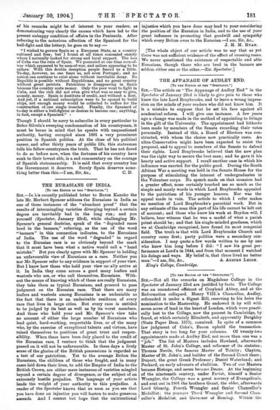THE EURASIANS OF INDIA.
[To THE EDITOR OF THE " SPECTATOR.")
SIR,—In his recently published letter to Baron Kaneko the late Mr. Herbert Spencer adduces the Eurasians in India as one of three instances of the "abundant proof" that the results of intermingling varieties diverging beyond a certain degree are inevitably bad in the long run ; and you yourself (Spectator, January 23rd), while challenging Mr. Spencer's general doctrine, speak of the "degraded races bred in the bazaars," referring, as the use of the word " bazaars " in this connection indicates, to the Eurasians of India. The use of the word "degraded" in regard to the Eurasian race is so obviously beyond the mark that it must have been what a native would call a "hand mistake." But you clearly agree with Mr. Spencer in holding an unfavourable view of Eurasians as a race. Neither you nor Mr. Spencer refer to any evidence in support of your view. But I know how those who hold your view um ally arrive at it. In India they come across a good many loafers and wastrels who are, or who call themselves, Eurasians. With- out the means of knowing which of these are really Eurasians, they take them as typical Eurasians, and proceed to pass judgment on the Eurasian race. That there are many loafers and wastrels among Eurasians is as undeniable as the fact that there is an undesirable residuum of every race that lives in large cities. But every race is entitled to be judged by its best as well as by its worst members. And those who hold your and Mr. Spencer's view take no account of either the large number bf Eurasians who lead quiet, hard-working, respectable lives, or of the many who, by the exercise of exceptional talents and virtues, have raised themselves to positions of great trust and respon- sibility. When these have been duly placed to the credit of the Eurasian race, I venture to think that the judgment passed on it will not be unfavourable. In these days a lively sense of the glories of the British possessions is regarded as a test of our patriotism. Yet to the average Briton the Eurasians, the children of those who fought, and in many cases laid down their lives, to add the Empire of India to the British Crown, are either mere instances of varieties mingled beyond a certain degree of divergence, or the subject of an extremely hostile prejudice. The language of your article lends the weight of your authority to this prejudice. A reader of the Spectator knows that as soon as you see that you have done an injustice you will hasten to make generous amends. And I cannot but hope that the unintentional






















































 Previous page
Previous page